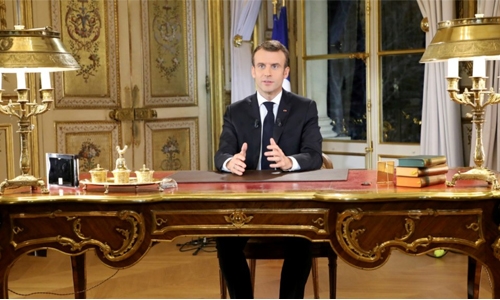Macron vows wage rise
Embattled French President Emmanuel Macron Monday announced a series of financial measures seeking to defuse the “yellow vest” revolt that has triggered violent protests in cities across the country. In a 15-minute televised speech from the Elysee Palace, a sombre-looking president told the nation, “I accept my share of responsibility” for the crisis. The former investment banker struck a more humble tone than usual as he sought to address criticism of his style of leadership.
“I know that I have hurt some of you with my statements,” he said. Macron stressed, however, that the protests by mostly low-income people in small town or rural France were the result of long-term problems. “Their distress doesn’t date from yesterday. We have ended up getting used to it,” he said. “These are forty years of malaise that have come to the surface.” Among the measures Macron announced was a 100 euro ($113) monthly increase in the minimum wage as of next year, for which businesses would not have to foot the bill.
The minimum wage was set at 1,498 euros a month pre-tax in 2018 and 1,185 euros after tax. Macron’s government had previously suggested that any increase in the minimum wage would destroy jobs rather than help create them. But the protests, which have seen rioting in Paris and other cities and taken a heavy financial toll, are the biggest challenge for Macron since he came to power in May 2017 promising to revitalise the economy. Since then his popularity has fallen with critics saying he favours the rich and alienates people struggling, especially in provincial France.
Pensions, overtime
The 40-year-old centrist also announced he would roll back most of an unpopular increase in taxes on pensioners introduced by his government. And he called on all businesses “that can afford it” to give employees a one-off “end of year bonus” which would be tax free. In another move to appease protesters’ anger, Macron said he would do away with all wage taxes on overtime work. Macron, who has been in power for the past 18 months, on Monday held four hours of crisis talks with top officials. He had previously vowed that unlike his predecessors he would not be swayed by street protests.
But in an initial attempt to quell the revolt now in its fourth week, the government agreed last week to cancel a planned increase in anti-pollution fuel taxes -- the spark behind the “yellow vest” protests in car-dependent rural and suburban France. The central bank on Monday halved its fourth-quarter growth forecast to just 0.2 percent from 0.4 percent -- far below the 0.8 percent growth needed to meet the government’s full-year target of 1.7 percent.
Related Posts

